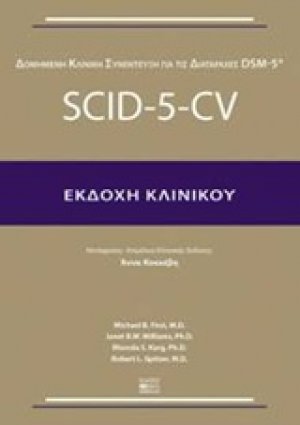

"synopsis" may belong to another edition of this title. Enhancing the reliability and validity of DSM-5 diagnostic assessments, the SCID-5-CV will serve as an indispensible interview guide. For example, it can ensure that all of the major DSM-5 diagnoses are systematically evaluated in adults characterize a study population in terms of current psychiatric diagnoses and improve interviewing skills of students in the mental health professions, including psychiatry, psychology, psychiatric social work, and psychiatric nursing. Versatile in function, the SCID-5-CV can be used in a variety of ways.

It also screens for 17 additional DSM-5 disorders. A unique and valuable tool, the SCID-5-CV covers the DSM-5 diagnoses most commonly seen in clinical settings: depressive and bipolar disorders schizophrenia spectrum and other psychotic disorders substance use disorders anxiety disorders (panic disorder, agoraphobia, social anxiety disorder, generalized anxiety disorder) obsessive-compulsive disorder posttraumatic stress disorder attention-deficit/hyperactivity disorder and adjustment disorder. The SCID-5-CV is an abridged and reformatted version of the Research Version of the SCID, the structured diagnostic interview most widely used by researchers for making DSM diagnoses for the past 30 years. Interview questions are provided conveniently along each corresponding DSM-5 criterion, which aids in rating each as either present or absent. Features include the following: - Questions assessing the DSM-5 criteria for each of the 10 personality disorders: Avoidant Personality Disorder, Dependent Personality Disorder, Obsessive-Compulsive Personality Disorder, Paranoid Personality Disorder, Schizotypal Personality Disorder, Schizoid Personality Disorder, Histrionic Personality Disorder, Narcissistic Personality Disorder, and Antisocial Personality Disorder.- An optional SCID-5.The Structured Clinical Interview for DSM-5(R) - Clinician Version (SCID-5-CV) guides the clinician step-by-step through the DSM-5 diagnostic process. The basic structure of the SCID-5-PD is similar to the other SCID-5 interviews (such as the Research Version, SCID-5-RV and the Clinician Version, SCID-5-CV) that cover non-personality DSM-5 disorders. In addition, a dimensional scoring component has been added to the SCID-5-PD.

Although the DSM-IV Personality Disorder criteria are unchanged in DSM-5, the SCID-5-PD interview questions have been thoroughly reviewed and revised to optimally capture the construct embodied in the diagnostic criteria. The SCID-5-PD name reflects the elimination of the multiaxial system in DSM-5. The SCID-5-PD is the updated version of the former Structured Clinical Interview for DSM-IV Axis II Personality Disorders (SCID-II).

The SCID-5-PD includes interview and the handy self-report screening questionnaire for patients or subjects, the Structured Clinical Interview for DSM-5(R) Screening Personality Questionnaire (SCID-5-SPQ). Designed to build rapport, the SCID-5-PD can be used to make personality disorder diagnoses, either categorically (present or absent) or dimensionally. The Structured Clinical Interview for DSM-5(R) Personality Disorders (SCID-5-PD) is a semistructured diagnostic interview for clinicians and researchers to assess the 10 DSM-5 Personality Disorders across Clusters A, B, and C as well as Other Specified Personality Disorder. Structured Clinical Interview for DSM-5 Personality Disorders (SCID-5-PD)


 0 kommentar(er)
0 kommentar(er)
